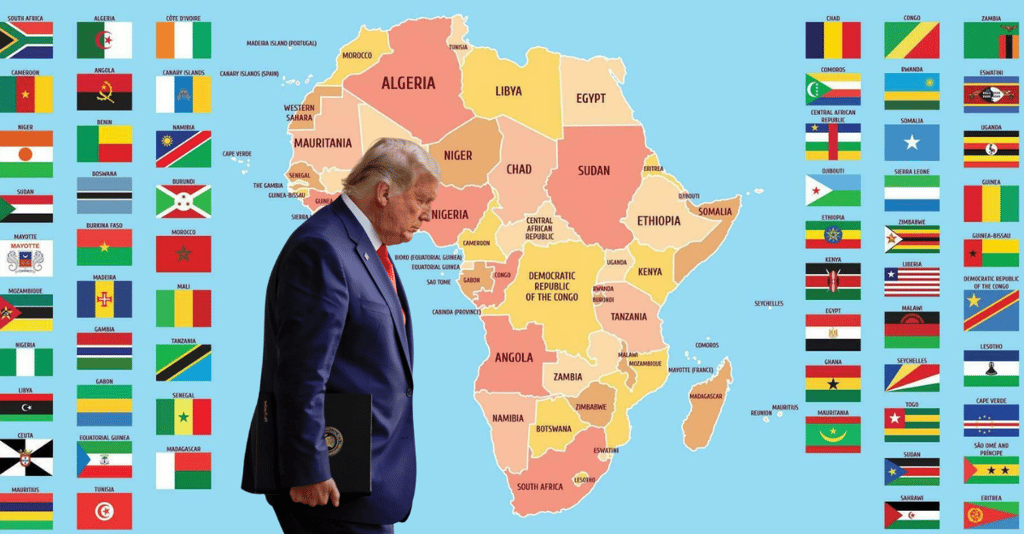US-African Relations: A Shifting Landscape Under Biden and Trump
A new study by African Narratives think tank analyzing the transformations in US-African relations from the Biden era to what is anticipated under a second Trump administration.
Ahmed Gamal El Sayad and Farouk Hussein Abu Daif, political researchers
2/25/20253 min read


The African continent remains a critical player on the global stage, a key area of influence for both Western and regional powers. As countries vie for dominance and access to Africa's vast natural and human resources, the United States has consistently sought to strengthen its presence and influence. This begs the question: what trajectory will US-African relations take, especially under the contrasting leadership of Presidents Biden and Trump?
A new study by researchers Ahmed Gamal El Sayad and Farouk Hussein Abu Daif at the African Narratives think tank delves into this crucial issue, analyzing the transformations in US-Africa relations from the Biden era to what is anticipated under a second Trump administration.
Biden's Approach: Partnerships and Climate Focus
The research highlights that President Biden’s administration pursued a strategy of strengthening American influence through partnerships focused on security and development. A key element was the emphasis on climate and environmental issues, which are particularly important for a continent grappling with the severe consequences of climate change.
However, the study also notes challenges faced by the Biden administration. Western influence waned in certain regions, notably the Sahel, where a series of coups created opportunities for powers like Russia to expand their presence. This shift underscores the evolving dynamics of power and influence in Africa.
Trump's "America First" and Concerns for Africa
Looking ahead, the study raises concerns about the potential impact of a second Trump administration in 2025. The researchers anticipate a cooling of relations due to Trump's "America First" policies. Specific anxieties include the potential repeal of the African Growth and Opportunity Act (AGOA), a vital trade agreement, withdrawal from the Paris Agreement, and an increased reliance on fossil fuels. These policies, reminiscent of Trump's first term, could have significant negative consequences for African nations, further straining US-Africa relations.
Key Differences and Potential Impacts:
The study identifies key areas where the administrations differ and analyzes the potential impacts:
Economic Relations: Trump's protectionist stance and potential repeal of AGOA could significantly impact African trade, hindering access to American markets. Conversely, continued support for AGOA could serve as a strategic tool for Washington to exert influence and access vital resources.
Climate Change: Trump's skepticism towards climate change and potential withdrawal from international agreements pose a serious threat to Africa, which is highly vulnerable to its effects. Reduced US support for climate initiatives would leave African nations with fewer resources to adapt and mitigate the impacts of climate change.
Immigration: Trump's strict immigration policies are expected to curb the flow of African immigrants to the United States, impacting those seeking opportunities and potentially hindering remittances.
Development and Military Aid: Reductions in US development and military aid, driven by the "America First" approach, could have detrimental effects on African nations, particularly in sectors like health, education, and counter-terrorism.
Sahel Region: The loss of the American military bases from Niger will have a negative effect on both the USA and Niger as America has used these military bases to monitor terrorist groups like the Islamic state and Al-Qaeda.
Challenges to Biden's Strategy: The Shifting Sands of the Sahel
The research also highlights the obstacles faced by the Biden administration. The rise of anti-Western sentiment and military coups in the Sahel region presented significant challenges to US influence. For example, Niger's termination of military cooperation agreements and the suspension of US military activities in Chad signal a shift in alliances and a growing desire for autonomy from Western powers. These developments have opened doors for Russia to increase its presence, further complicating the geopolitical landscape.
The study suggests that the withdrawal of US forces may embolden terrorist groups operating in the region, potentially destabilizing the area and creating further security challenges.
Looking Ahead: Uncertainty and Potential Realignment
The study concludes that a second Trump administration is likely to adopt a stricter approach towards Africa, potentially reversing some of the progress made under Biden. This could lead to a further loosening of relations between Washington and the continent, particularly in regions like the Sahel.
The future of US-Africa relations hinges on a complex interplay of factors, including domestic politics in both the United States and African nations, the evolving geopolitical landscape, and the choices made by leaders on both sides. This study provides valuable insights into the potential transformations and challenges that lie ahead, underscoring the importance of thoughtful engagement and a nuanced understanding of the continent's diverse needs and aspirations.
Download the full study here.
Empowerment
Amplifying African voices for sustainable progress together.
Contact US
Growth
Street No. 3281, N'Djamena, Republic of Chad.
© 2024. All rights reserved.